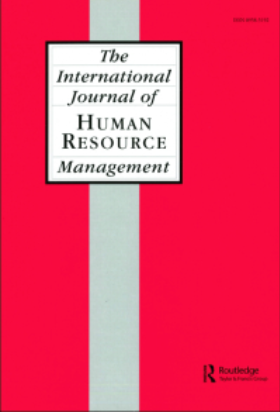多维工作-非工作平衡:平衡的员工工作效率高、生活满意吗?
IF 5.9
2区 管理学
Q1 MANAGEMENT
International Journal of Human Resource Management
Pub Date : 2023-09-19
DOI:10.1080/09585192.2023.2258335
引用次数: 0
摘要
随着工作和非工作需求的不断增加,实现工作与非工作(WNW)的平衡对许多员工来说是一个重要的优先事项。学者们直到最近才将西北纬平衡定义为多维的,因此,我们对其前因后果的理解是有限的。利用资源守恒理论,我们探讨了组织如何支持员工实现WNW平衡,以及“平衡”的员工是否在工作中更有效率,对生活更满意。在此基础上,我们假设主管工作岗位支持对员工生活满意度和工作绩效的正向影响是通过多维工作岗位平衡来调节的。我们发现,在两项各有两波的研究中,只有工作幸福感平衡有效性维度而不是工作幸福感平衡满意度维度介导了工作幸福感、生活满意度(研究1和研究2)和自我评价工作绩效(研究1)之间的关系。工作幸福感和上级评价工作绩效(研究2)之间的关系不受工作幸福感平衡维度的中介作用。因此,组织可以通过FSS促进WNW平衡,而“平衡”的员工似乎确实对他们的生活更快乐,并认为自己在工作中表现更好。我们讨论了关于西北西北平衡有效性优于西北西北平衡满意度的意外发现,并描述了重要的理论和实践意义,这些发现与西北西北平衡的多维概念有关。本文章由计算机程序翻译,如有差异,请以英文原文为准。
Multidimensional work-nonwork balance: are balanced employees productive at work and satisfied with life?
Given ever increasing work and nonwork demands, achieving work-nonwork (WNW) balance is an important priority for many employees. Scholars have only recently settled on a definition of WNW balance as multidimensional and, as such, our understanding of its antecedents and outcomes is limited. Drawing on Conservation of Resources theory, we explore how organizations can support employees to achieve WNW balance and whether ‘balanced’ employees are more productive at work and satisfied with life. In detail, we hypothesize that the positive effect of supervisor WNW support (FSS) on employees’ life satisfaction and job performance is mediated by multidimensional WNW balance. We find, across two studies with two waves each, that only the dimension of WNW balance effectiveness and not the dimension of WNW balance satisfaction mediated the relationships between FSS, life satisfaction (Study 1 and 2) and self-rated job performance (Study 1). The relationship between FSS and supervisor-rated job performance (Study 2) was not mediated by either WNW balance dimension. As such, organizations can facilitate WNW balance through FSS, while ‘balanced’ employees seem indeed happier with their life and consider themselves to be better performing at work. We discuss the unexpected finding regarding the superior role of WNW balance effectiveness over WNW balance satisfaction for our outcomes in relation to the conceptualization of WNW balance as multidimensional and delineate important theoretical and practical implications.
求助全文
通过发布文献求助,成功后即可免费获取论文全文。
去求助
来源期刊
CiteScore
11.70
自引率
7.10%
发文量
77
期刊介绍:
International Journal of Human Resource Management is the forum for HRM scholars and professionals worldwide. Concerned with the expanding role of strategic human resource management in a fast-changing global environment, the journal focuses on future trends in human resource management, drawing on empirical research in the areas of strategic management, international business, organizational behaviour, personnel management and industrial relations that arise from: -internationalization- technological change- market integration- new concepts of line management- increased competition- changing corporate climates Now publishing twenty-two issues per year, The International Journal of Human Resource Management encourages strategically focused articles on a wide range of issues including employee participation, human resource flow, reward systems and high commitment work systems. It is an essential publication in an exciting field, examining all management decisions that affect the relationship between an organization and its employees. Features include; -comparative contributions from both developed and developing countries- special issues based on conferences and current issues- international bibliographies- international data sets- reviews

 求助内容:
求助内容: 应助结果提醒方式:
应助结果提醒方式:


